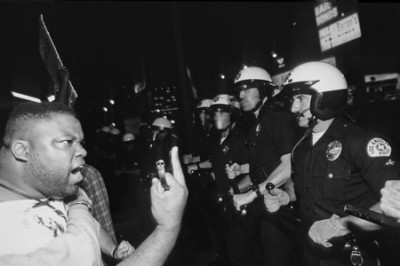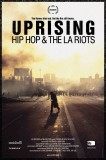| Reviews & Columns |
|
Reviews DVD TV on DVD Blu-ray 4K UHD International DVDs In Theaters Reviews by Studio Video Games Features Collector Series DVDs Easter Egg Database Interviews DVD Talk Radio Feature Articles Columns Anime Talk DVD Savant Horror DVDs The M.O.D. Squad Art House HD Talk Silent DVD
|
DVD Talk Forum |
|
|
| Resources |
|
DVD Price Search Customer Service #'s RCE Info Links |
|
Columns
|
|
|
Uprising: Hip Hop and the L.A. Riots

Reviewed at the 2012 South by Southwest Film Festival
Uprising: Hip Hop and the L.A. Riots opens with the camera accompanying Mr. Rodney King on a walk through Los Angeles. Here's a point of interest: "...and I was down here on the ground, getting my brains beat in." That happened on the night of March 31, 1991, and it might have disappeared into the ether, yet another example of the brutality of the LAPD, had a resident in a nearby apartment building not had a video camera handy. The tape of Mr. King's beating became one of the most famous amateur videos in history, and was at the center of a seemingly open and shut case against the four cops wielding those batons. And then they were all acquitted, and the city of Los Angeles went up in flames.
Mark Ford's Uprising was produced for VH1's "rock docs" series, so it looks at the days of rioting that followed through the prism of rap music--songs that predicted the riots, responded to them, and maybe even contributed to them. But it's not an arbitrary juxtaposition; Chuck D famously called rap "black America's CNN," and it had, for years, been bottling the rage and frustrations that exploded in April and May of 1992.
Ford's film has just enough history (he flashes back to Chief Parker, the Watts riots, the Gates/crack era); he's mostly interested in placing the viewer into the middle of the uprising itself. The segments dealing with the beginning of the riots are the film's best, as Ford presents an almost minute-by-minute account of the post-verdict environment over the long afternoon and evening of April 29, 1992. His primary tool for telling that story is the amazing footage of amateur filmmaker Matty McDaniel, who took his S-VHS camera down to the community meetings and into the eye of the storm, to talk to the people there.
Via the home videos of McDaniel and others, Ford rivetingly plops you right into the middle of that scene, and conveys something of the overwhelming tension that was boiling. The cutting is terse and powerful; editors Martin Cutler and Paris Patton score these scenes with period hip-hop, brilliantly marrying the images and the music, letting them comment on and communicate with each other. The beats of NWA, Ice Cube, and KRS-One are like the ticking of the South Central time bomb about to explode; they later became the sonic equivalent of documentary footage, and the film fascinatingly details how Dr. Dre's riot dispatch "The Day the Niggaz Took Over" was created and recorded during the event itself. (Later, a compelling case is made for The Chronic's place as the soundtrack of post-riot Los Angeles.)
Ford talks to musicians, journalists, historians, King, and Henry Watson, one of the men who pulled Reginald Denny from his truck at the intersection of Florence and Normandy and very nearly beat him to death. Watson is one of the more chilling figures in the film (when asked what Denny was to him, Watson coldly replies "Nothing"), but Ford manages to push past his surface and get something of an understanding of who this guy is and why he did what he did.
He is less successful at dealing with the issue of the famous looting, an element of the riots that has proven troublesome to most narratives, then and now. Some of this footage is played for laughs, and some of the interview subjects still seem to find that aspect of the rioting funny, or somehow empowering, when it was really just sad. It's tempting to hope that he merely lets us draw our own conclusions here, but he simply doesn't have a powerful enough directorial voice to transcend the sentiments of these sequences; this section is also one of many reasons why the idea of having Snoop Dogg provide narration for the film is such a poor one. That molasses-voiced MC's approval of the looting becomes the film's, and his contention that, in the looting, there was "unity" in the streets ignores the number of black-owned businesses ransacked and bankrupted. And the film dutifully follows suit.
That's just one important thread that the film's TV-friendly running time ignores; Ford also discusses Ice-T's "Cop Killer" as a response to the King tape while mostly ignoring the political firestorm that record set off, and though Arsenio Hall is interviewed, no mention is made of the gutsy shows he did during the riots. It's a short film--things are going to get left out, and make no mistake, Uprising: Hip Hop and the L.A. Riots plays from moment to moment. It is mostly in retrospect that its incompleteness becomes clear.
Jason lives in New York. He holds an MA in Cultural Reporting and Criticism from NYU.
|
| Popular Reviews |
| Sponsored Links |
|
|
| Sponsored Links |
|
|
| Release List | Reviews | Shop | Newsletter | Forum | DVD Giveaways | Blu-Ray | Advertise |
|
Copyright 2024 DVDTalk.com All Rights Reserved. Legal Info, Privacy Policy, Terms of Use,
Manage Preferences,
Your Privacy Choices | |||||||










